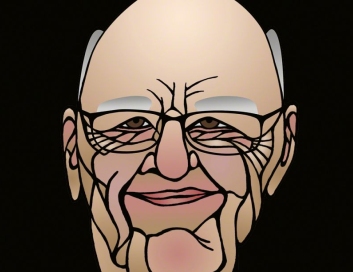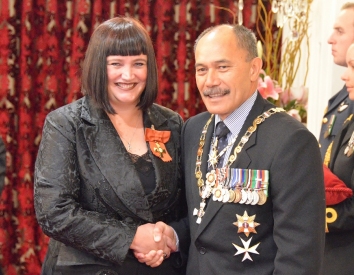Matthew Peel unpacks the recent history of Australian rugby, arguing that former CEO Raelene Castle did not deserve to be forced out of her position.
RAELENE CASTLE resigned less than three years into her role as head of Rugby Australia (RA). Her sign-off hinted that RA board members had lost confidence in her capacity as CEO and that they wanted "clean air".
This came days after 11 former Wallabies captains demanded an urgent overhaul of RA headquarters.
There is some conjecture amongst Australian rugby fans as to underlying reasons for her departure. The version of events you have consumed will depend on your information sources.
A casual Australian rugby fan discussing reasons for RA’s most recent debacle may reference the disastrous Wallabies 2018 season. The name Israel Folau may enter the fray. A perceived contractual feud between long time broadcaster Fox sports and RA will get a mention.
Even though the 2018 Wallabies season was the worst on record, it wasn't as if the organisation's performance had fallen off a cliff. This season was the low point of a decade long chasm of mediocre performances and record losses.
In 2010 they lost to Irish provincial side Munster. This was followed by a loss to Samoa in 2011. Robbie Deans resigned in 2013 after a failed British and Irish Lions tour. New appointee Ewan Mackenzie sparked hope with four out of five wins during the European tour.
However, it quickly deflated with Mackenzie finishing his national coaching career with a 50% win rate and a world ranking of 6th. Michael Cheika was named Mackenzie's successor, making him the third national coach in two years.
The Wallabies performed surprisingly well at the 2015 Rugby World Cup (RWC) with a runner's up finish.
We witnessed a nosedive in 2016 with a 3-0 series loss to England. While in 2017, the Wallabies suffered their fifth straight loss against England and a record loss to Scotland.
Late 2017 saw Raelene Castle enter the scene as CEO of Rugby Australia. As mentioned, her inaugural season of 2018 was the worst year in Australian rugby history, with 4 wins from 13 tests.
But considering the lead up to this season, the nightmare of 2018 was hardly a surprise. There was an unnerving feeling that the Wallabies woes were set to continue. It was obvious that Australian rugby had become bloated at the top end, in terms of financial allocation and national focus. To ensure the future of rugby in Australia there were calls for sacrifices to be made — the Wallabies success being one of those.
The bitter tale of Israel Folau's career garnered international media exposure and was the highlight, good or bad, of Castle’s RA journey.
Israel was sacked in May of 2019 for a homophobic Instagram post. This came on the back of a similar post, which he was given a warning for, the previous year. Some say that Castle should have halted Folau's participation in the game after the first incident.
In hindsight, this may have been the right decision considering he was nearing the end of his contract.
However, the World Cup was looming and Folau was Australia's best player, not an obvious decision at the time. Others maintain that Israel had every right to say what he did. In a time of sharply declining "contact sport" participation rates, rugby needed to appeal to every corner of the Australian market.
This included the LGBT community and those who empathise with their struggles, such as having suicide rates two and a half times higher than non-LGBT persons.
Folau's eventual sacking was triggered by an independent panel. Castle stated that his "post" was incompatible with the game’s value of inclusiveness. Following this decision, Castle received a death threat from a Folau fan.
This forced RA to beef up security at its headquarters and order a review of Castle’s residence. The Folau saga sparked the avalanche of bullying aimed at Castle, recounted by Paul McLean, the interim CEO.
The bullying was widespread. She wasn't just the butt of malicious comments on social media. Mainstream media giants like Alan Jones were also laying the boot in. As were Fox sports commentators, with Phil Kearns leading the charge.
There was a mixed representation of the "Foxtel vs Castle feud" at the start of 2020. Pay-TV giant Foxtel had been a long-time broadcaster of rugby in Australia. Upon negotiation attempts for a new TV deal earlier this year, Castle stood strong when Fox offered only $20 million per year ($37 million per year short of their last deal).
Castle braved the unknown and took broadcasting rights to the open market, capturing the interest of Optus who reportedly offered upwards of $30 million. Rugby Union is a less attractive product than it was 10 years ago which accounts, to an extent, for the lowball offer made by Foxtel (a subsidiary of Rupert Murdoch's News Corp).
However, being synonymous with Australian Rugby for so many years, Foxtel was keen to keep it in its sporting stable. Negotiations hadn't gone to plan for Foxtel; in their eyes, Castle wasn't "playing ball". The hard-nosed approach taken by Castle may have forced Foxtel to reconsider its offer.
If not, a move to a new broadcaster like Optus could have been the fresh start RA needed.
Generally, BBQ catch-ups and "off the cuff" social media comments fail to capture a subject's complexity. Upon reading and watching the latest RA updates in the "mainstream" media, there seems to be little mention of the 'grassroots' initiatives during Castle's time in office.
A first glance example of RA directing more attention towards grassroots rugby is their recently updated website. The only Wallabies or Super Rugby mention on the home page is a photo of Matt To'omua strewn amongst a collage of junior club players, girls and boys.
There is a "community" section which publishes a wide range of articles including regional junior club news and stories from Australia’s deaf rugby competition. These seemingly minor presentations signify an emphasis shift to a 'bottom-up' approach, sorely needed in an organisation that had become too focussed on elite-level performance.
The "trickle-down" approach, taken by Australian rugby administrators for many years, hinged on the hope that the Wallabies win and Super Rugby success would lead to a boost in registration. Demonstrated by the steep decline in Rugby participation rates over a 15-year period, approximately 63%, this needed to be flipped. And Castle appeared to be in the early stages of implementing such essential change.
Grassroots success could also be observed in Australia's performance in the most recent Junior Rugby World Cup where they finished runners up. Their previous finals finish was in 2011 where they came 3rd.
Over the past few years, more extensive live streaming and recording of weekly QLD Premier Rugby games has been put in place. This has proven to be an invaluable resource for skill development, team efficiency and player exposure.
There was the continued promotion of the National Rugby Championship (NRC) and more precisely, when examining Castle’s reign, the introduction of an NRC division 2. If you're not familiar, this competition includes teams from South Australia, Victoria, Tasmania and Western Australia (amongst traditional rugby states). It enables a pathway for untapped talent and, from a business perspective, opens up several new demographics.
Castle's negotiations with the Rugby Union Player's Association (RUPA) were fruitful. Discussions concluded with, for the first time, the Wallabies, Wallaroos, all Super Rugby players and both Australian Rugby Sevens squads being bundled together.
This meant more tiers gaining access to the revenue share model, which sees all representative players tapping into 29% of revenue generated by the professional game.
The Super W competition (Australian women's Super Rugby championship) was an endeavour sparked in 2018. When looking to strengthen a sport's foundation, female participation is essential. This initiative was a positive step.
Other examples of grassroots promotion were the introduction of the "size for age" guidelines for junior rugby, clear and inexpensive pathways for junior and senior referees, forging an alliance with "International Gay Rugby" to promote participation amongst Australia's LGBT community, continued support for the AON University 7s competition, and strengthening the link between RA and the Lloyd McDermott Rugby Development Team, providing opportunities for First Nation's people.
Considering a balanced account of the "Raelene Castle situation", there doesn't seem to be a standout blunder necessitating resignation or a vote of no confidence. However, there seemed to be a much greater level of dislike for this CEO than any other over the past two or three decades.
Her appearance may have been a factor. Unfortunately, people are quick to judge a book by its cover.
There may have been an element of misogyny. Rugby in Australia is still considered a "gentleman’s club", even after many years of mums and sisters and daughters contributing and playing in local and topflight rugby. In a wider context, it is common for women in powerful positions to receive vitriol in no way related to their skills, abilities or qualifications.
It could be that Castle was not prepared to play the role of a puppet for Fox Sports in their broadcast rights dealings. Consider, for a moment, the main characters involved in deconstructing confidence in Castle's ability to lead. Alan Jones and Phil Kearns are employees of News Corp and Foxtel, respectively.
Since Castle's appointment there has been continued, subjective critiques of her performance by these influential men. This ramped up after the Folau saga, but even more so following the "failed" negotiations at the beginning of this year. News Corp has a significant interest in Wallabies and Australian Super Rugby franchise success, as these entities are the masthead of its rugby product.
A redirection of funds by RA towards grassroots rugby and away from the elite division would no doubt result in a period, potentially 10 years, of poor performances. This leads to a temporary loss of public interest, equating to a decreased TV audience and lower advertising revenue.
Someone with an interest in media bias may even draw parallels to Australia's current political environment. A large portion, 70% in fact, of Australia's newspaper distribution is owned by News Corp. This is not to mention their online presence such as News.com.au. It is known that this level of media power encourages a "mediacracy" whereby, to influence public policy, a media group will stridently support a political party (in Newscorp Australia's case, the Liberal and National parties) and certain candidates within them.
Considering this, Australian Rugby supporters must question the viability of appointing a CEO with strong links to the media company. For instance, would the appointment of Phil Kearns (long time News Corp employee) secure Australian Rugby's future, or Foxtel's revenue stream?
In any case, if Rugby in Australia is to flourish (or even exist) into the future those in power need to decide which end of the game to emphasise.
Is their goal a positive, long-term outcome by nurturing the juniors to Wallabies pathways, or short-term success at the elite level?
There can and should be a balance of both. However, that balance needs to tip significantly towards grassroots, as the current approach is not sustainable.
Matthew Peel is a Physiotherapist with an interest in the importance of critical thinking, exposing media bias and promoting progressive policy.
 This work is licensed under a Creative Commons Attribution-NonCommercial-NoDerivs 3.0 Australia License
This work is licensed under a Creative Commons Attribution-NonCommercial-NoDerivs 3.0 Australia License
Support independent journalism Subscribe to IA.











